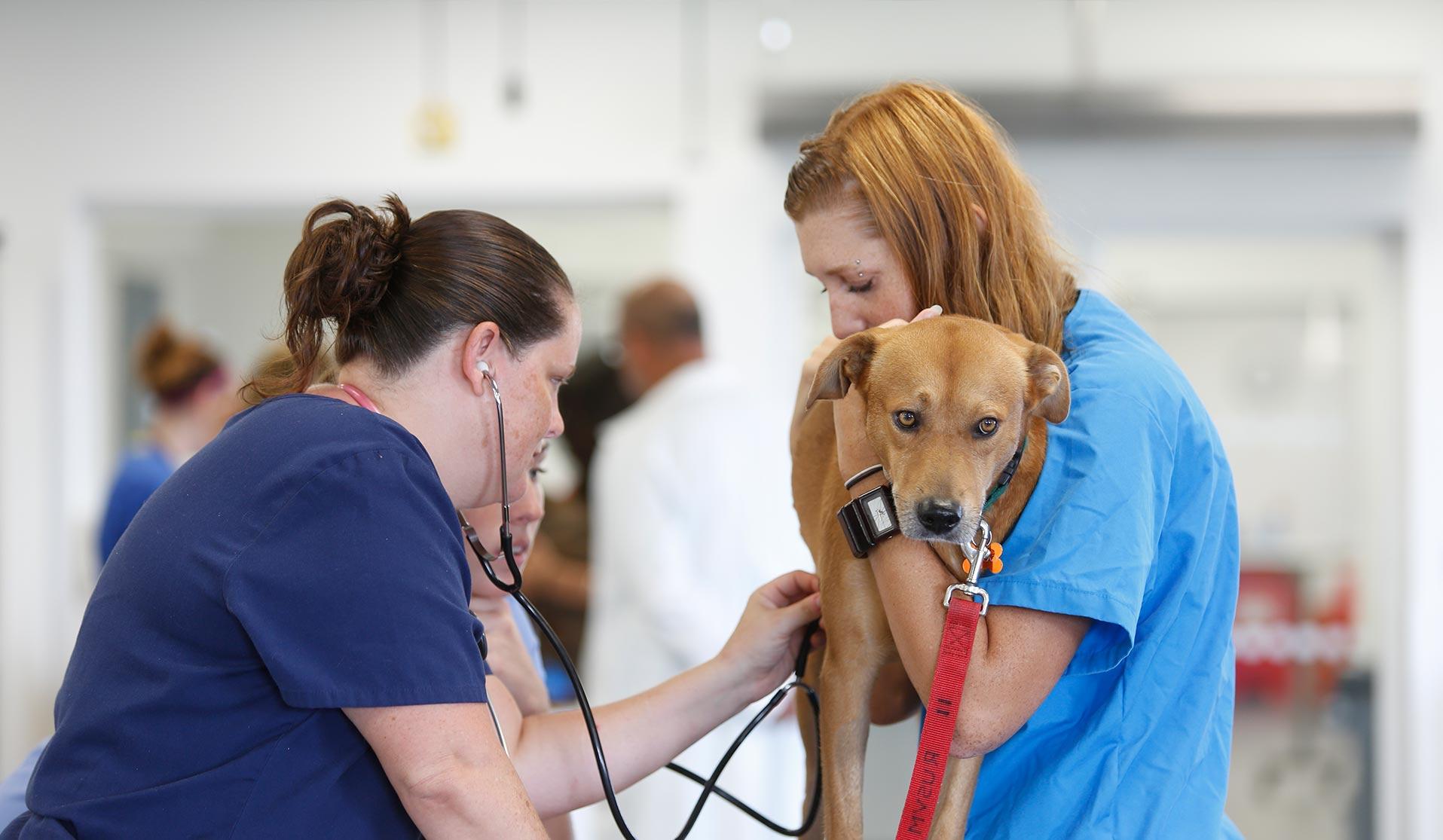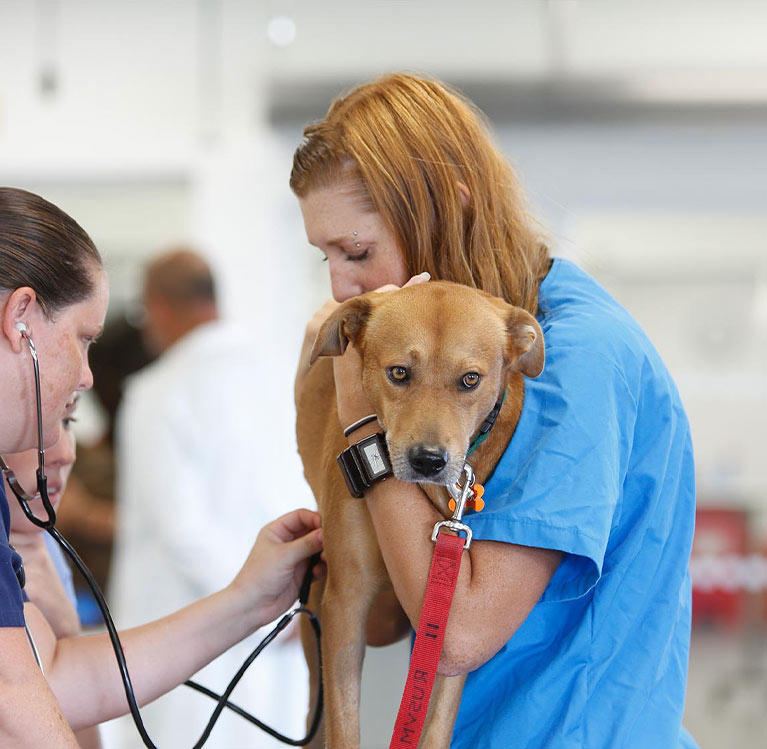YOUR CLINICAL AFFILIATE PLACEMENT
Share in the selection process for your clinical experience. In your 6th semester, you’ll work alongside our Clinical Affairs team identifying multiple clinical affiliates you are interested in attending. A number of factors are considered during a student’s clinical affiliate placement, including international status, overall GPA, and academic performance in preclinical semesters.
While you aren’t guaranteed placement in your affiliate school of choice, we work with you to weigh the many factors and find a good fit for this important clinical year of veterinary medical education.
Colorado State University - Fort Collins, CO
Cornell University - Ithaca, NY
Iowa State University - Ames, IA
Kansas State University - Manhattan, KS
Louisiana State University - Baton Rouge, LA
Massey University - Palmerston North, New Zealand
Michigan State University - East Lansing, MI
Mississippi State University - Starkville, MS
Murdoch University College of Veterinary Medicine – Murdoch, OT, AU
North Carolina State University - Raleigh, NC
Oklahoma State University - Stillwater, OK
Ontario Veterinary College – University of Guelph - Guelph, Ontario, Canada
Oregon State University - Corvallis, OR
Purdue University - West Lafayette, IN
Royal (Dick) School of Veterinary Sciences at the University of Edinburgh - Roslin, United Kingdom
Royal Veterinary College - London, United Kingdom
Texas A & M University - College Station, TX
The Ohio State University - Columbus, OH
Tufts University - North Grafton, MA
University College Dublin -Dublin, Ireland
University of California at Davis - Davis, CA
University of Florida - Gainesville, FL
University of Illinois - Urbana-Champaign, IL
University of Liverpool School of Veterinary Science - Liverpool, United Kingdom
University of Minnesota - St. Paul, MN
University of Missouri - Columbia, MO
University of Montreal - Montreal, QC, Canada
University of Tennessee- Knoxville, TN
University of Wisconsin - Madison, WI
Virginia-Maryland College of Veterinary Medicine - Blacksburg, VA
This list was last updated July 2024 and is subject to change. The University of Montreal does require fluency in French. Murdoch University College of Veterinary Medicine will have a January intake only.
Discover How Clinical Rotations Work
Get the details on your clinical year.
After your Clinical Placement is announced, you’ll prepare for an intensive clinical year of rotations, inclusive of a minimum 20-weeks core clinical experience and 25 weeks of electives, externships and any additional requirements of your clinical site. Each clinical rotation varies in length, providing you with hands-on experience and immersion in multiple disciplines of veterinary medicine.
- Small-Animal Medicine:
- Minimum of 4 Weeks
- Small-Animal Surgery:
- Minimum of 4 Weeks
- Medical Services:
- Anesthesiology (Minimum of 2 Weeks)
- Diagnostic imaging (Minimum of 2 Weeks)
- Diagnostic Pathology: May include clinical pathology, parasitology, microbiology, and necropsy services (Minimum of 2 Weeks)
- Emergency/Critical Care:
- Minimum of 2 Weeks
- Large-Animal Medicine: A minimum of 4 weeks in one of the following:
- Food Animal Medicine and/or Surgery: Includes ambulatory services, theriogenology, and/or food-animal production medicine where offered
- Equine Medicine and/or Surgery: Includes ambulatory services where offered
Enhance Your Clinical Experience with Electives and Externships
Create the clinical experience you need for the career you want.
Electives and externships are used to maximize the value of your clinical experience. Focus on a veterinary specialty of interest in an elective or engage in experiential learning through an off-campus, supervised externship.
ELECTIVES
Electives are evaluated rotations on campus that allow you to focus on a veterinary specialty to further your learning beyond the core curriculum. Not all electives receive a letter grade.
EXTERNSHIPS
Externships provide you with an experiential learning opportunity to actively explore your veterinary medical interests (i.e., exotic animal medicine or lab animal medicine) under-qualified DVM. It provides time to strengthen an area of weakness or begin to pursue internship and employment opportunities. Externships may be conducted anywhere in the world, provided they are approved by the clinical affiliate. An externship is an off-campus, supervised, and evaluated learning experience and students typically receive a pass/fail grade after completion.
Your externships must meet the following criteria:
- Must be directly supervised and evaluated by a fully qualified, practicing DVM
- State licensed veterinarian
- Must be in a veterinary or veterinary-related field
- Must be approved by your affiliate school (except for Cornell University, University of Tennessee, Kansas State University, and Virginia-Maryland University*).
Throughout your externship experience you will work with a preceptor(s) of your choice who may be involved in one (or more) of the following areas:
- Private or specialty practice
- Diagnostic laboratories
- Research
- Zoo, exotic, or lab animal medicine
- Alternative medicine
- Federal or state service
- Industry
- Other pre-approved area
Externship Approval
Before accepting an externship, you must seek approval from your clinical affiliate.
Externship Time Commitment
Ross Vet requires that students spend a minimum of 35 hours per week in their chosen externships (your requirement for graduation is based upon weeks and not hours). Externships are for 2 or 3 weeks, depending on your number of weeks for your rotations at your clinical affiliate. One week is the equivalent of one credit hour.
Compensation for Externships
Students may accept stipend/compensation from the externship site, if offered. All compensation including scholarship, stipends, or reimbursement for other expenses (e.g. travel, food, and lodging) must be reported to the Student Finance office. Accepting compensation in any form may affect your financial aid. For more information contact Student Finance.
Externship Evaluation
In order to apply towards clinical credit to graduate, all externships must have an evaluation completed by your externship supervisor (supervising veterinarian). Evaluators will use the evaluation form of the affiliate school that you attend except for Kansas State University (KSU), University of Tennessee (UT), Virginia-Maryland University (VT) and Cornell University*.
In addition, students may be asked by their affiliate school to submit an evaluation of the externship experience for the benefit of future students.
All students are responsible for confirming that the evaluation of their externship has been returned to the appropriate person at their affiliate school or Oklahoma State University if attending KSU, UT, VT, or Cornell University. The externship supervisor must submit an evaluation of your performance for you to receive academic credit.
*Oklahoma State University manages externships for students at KSU, UT, VT, and Cornell University
REVIEW OTHER IMPORTANT CLINICAL EXPERIENCE INFORMATION
Beginning in your 1st and 6th semesters, and continuing with multiple presentations in your 7th semester at Ross Vet, the Clinical Affairs team will provide you with all the information you need to successfully complete your clinical rotations.
Your affiliate school will require malpractice insurance. This insurance is provided for your clinical year through Essex Insurance Company. This Policy can be found in the RUSVM Portal under Clinical Affairs.
Your Ross Vet tuition also includes membership in the Student American Veterinary Medical Association (SAVMA). This makes you eligible for AVMA® Professional Liability Insurance Trust (PLIT®) which provides SAVMA members with access to free student liability coverage for the entire duration of your veterinary schooling. Coverage keeps you safe during clinicals, externships, and other experiences that occur outside of school.*
*Until the day you become a licensed veterinarian, or the end of the policy year, whichever comes first.
- Passing the NORTH AMERICAN VETERINARY LICENSING EXAMINATION® (NAVLE®) is a requirement to practice veterinary medicine in the US and Canada. This computer-based, multiple-choice examination administered by the International Council for Veterinary Assessment (ICVA) is offered throughout North America and at certain overseas sites typically during a four-week testing window in November-December, and a two-week window in April.
- Information on this essential licensing examination is available on the ICVA website.
- Once you’ve graduated and passed the NAVLE®, you’ll need to meet the requirements of the jurisdiction where you wish to be licensed. The American Association of Veterinary State Boards (AAVSB) provides these details and serves to support veterinary licensing boards across the U.S., Canada, the U.S. Virgin Islands, and Puerto Rico.
- Additional information is available at the AAVSB website.





